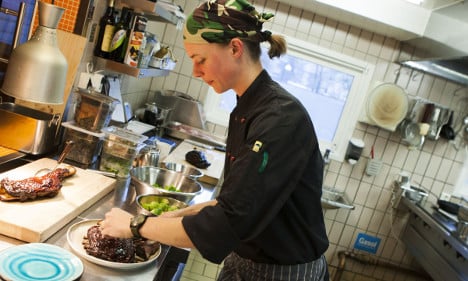MICHELIN
First Swedish woman wins Michelin star
Three restaurants in Malmö in southern Sweden have become the first in the city to be awarded a Michelin star, with one head chef the first woman in the country to score the top culinary honour.
Published: 26 February 2015 10:48 CET

Titti Qvarnström, the first female head chef at a Michelin-starred Swedish restaurant. Photo: Bloom in the Park
Bloom in the Park, a European-style restaurant which overlooks Pildammsparken, a beautiful public park in Malmö, does not have a menu. Instead, it promises that "the best is served according to availability, day and mood".
The Local spoke to its head chef Titti Qvarnström, 35, just an hour after she learned that her restaurant had scooped a Michelin star as the first Michelin Nordic Cities guide was presented in Stockholm.
"I found out when everyone else did," she said.
"We knew that judges had been in the area and of course I thought we deserved one for what we do. So it's great! It's an amazing feeling and I am especially pleased that it puts my home city Malmö on the culinary map."
It is the first time that the famed guide has included cities from outside of the Nordic capitals.
Malmö lies just over the famous Öresund bridge to Copenhagen, which has a dozen Michelin-starred restaurants and enjoys boasting that it is the culinary hub of Scandinavia.
"I guess people won't have to cross the bridge now," smiled Qvarnström who trained in Denmark before working in kitchens around Europe. Bloom in the Park is her first restaurant in Sweden.
The city's tourism office said it was proud of the city's growing reputation as a destination for food and beverage fans.
"Malmö has in recent years become the home of more and more exciting food initiatives and restaurants, often unexpected and a bit quirky," it wrote in a press statement on Thursday.
"With three star restaurants in the Michelin Guide, we've put Malmö on the fine-dining map," Johan Hermansson, director of tourism for the city said in the same news release.
Despite Sweden having a global reputation for gender equality, the win in Malmö represents the first time that a kitchen run by a female chef has been given a star.
"It really is a mystery to me why there are so few women in this profession," she said.
"It's an easy excuse to say it's because women have children or want to have children, because we have this fantastic system in this country where the state helps both mothers and fathers even if they are working irregular hours. There are plenty of leading women chefs in other countries that don't have the same facilities as us," she added.
"I hope that I can be an inspiration to more women choosing to go down this road."
Elsewhere in Sweden, three restaurants in Stockholm were each awarded two stars: Frantzén, Mathias Dahlgren-Matbaren and Oaxen Krog, which was given the honour for the first time. Six other eateries in the capital were given one star.
Gothenburg now boasts six Michelen-starred restaurants with Koka and Mat & Människor joining the ranks for the first time.
The other two restaurants in Malmö to score with the judges for the first time were Ambiance à Vindåkra and Vollmers.
Over in Denmark, the city of Aarhus was celebrating, with three restaurants there given their debut Michelin stars.
Url copied to clipboard!


 Please whitelist us to continue reading.
Please whitelist us to continue reading.